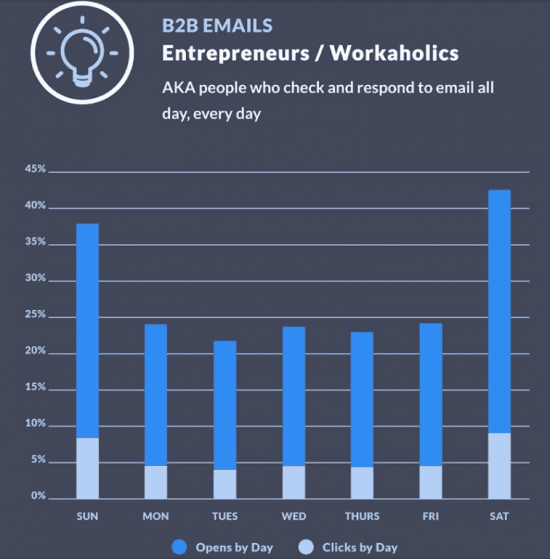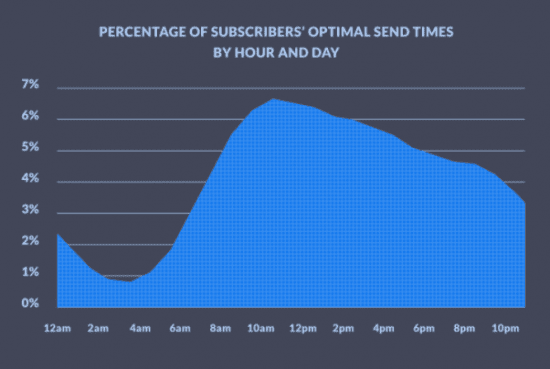When is the best day and time to send an email to suit your target audience?
When most email marketers consider how time relates to their efforts, they’re quick to focus on what hour is best to blast their communications. While deploying emails at an unfavorable time can certainly lead to lower engagement levels, many other time-related variables should also be considered — audience demographics, life milestones, the price of the service or offering that’s being marketed, and more.
With a deeper awareness of the issues in play, you can use the “time factor” to your advantage and better set up your campaigns for success.
Timing Is (Almost) Everything
The best times to send emails are not set in stone, nor is the deployment cadence of a campaign — or even the type of content you should send in each touchpoint. However, age information and other data about your target audience can help you make more informed decisions around these foundational elements.
Think about this: older people tend to perceive the passage of time at a faster rate than younger people. Could that mean, then, that a more frequent cadence would work better for a younger audience? Would that tactic help keep your offering top of mind week after week until a sale is made? On the contrary, would an older consumer feel pestered by a brand that sends emails at that “younger cadence,” preferring less frequent communication?
How can you be “time-sensitive” in your approach to email marketing without driving yourself crazy trying to understand all the potential variables? These four tips can help you to identify some best practices for your next campaign:
Draw on Data
As with all marketing, the more relevant data you have, the better your results will be. The key word here is “relevant.” If you have millions of email addresses without demographic information, then your communications may be no more effective than the average spammer’s blast about diet pills.
Similarly, if you have no understanding of your recipients’ attitudes toward your brand or their propensities to buy at any given time, you’ll just be shooting a shotgun into the sky hoping you’ll hit what you’re trying to hunt. Keep in mind that today’s customers often sign up for email lists on the basis of a simple offer like a free T-shirt or a discount code.
Even if a brand sends its emails at exactly the right time, a lot of its list may not have any interest in the offering. Slicing whatever data you do have and forming your list on the basis of previous engagement metrics or other factors could help ensure you’re speaking to a receptive audience, to begin with. Also, the use of a mini-survey module within your ongoing emails could help you begin to paint the data picture you need.
Customize Communications
To cross multiple age demographics, diversify your messaging within individual campaigns. A 55-year-old father of two with a blue-collar job in Iowa might actually want the same product as a 26-year-old single professional woman in Seattle, but they will make their purchasing decisions using very different logic.
Further, they will likely check their email accounts at different times of the day. She might use her lunch break to catch up, while he might not have time to browse until Friday evening.
Surprisingly, entrepreneurs and other ultra-busy types tend to respond best to B2B communications sent on weekends, according to Propeller CRM. Its study also found that most people open new emails in the morning, suggesting that overnight sending could improve your open rates.
What’s more, older and younger people may use very different criteria in determining their desires to click through or purchase. The 55-year-old man may want lots of facts laid out right there in the email, along with multiple links to click that offer even richer data points for him to consider, whereas the 26-year-old woman may prefer a pithy, easily scannable message and only a couple of links to a focused landing page in order to close the deal for her.
By using A/B testing broken down by demographic, you could discover the solutions that work best for your particular audience nuances.
Fiddle With Frequency
The timing of emails can vary wildly depending on the type of action you want a customer to take. For example, at the conclusion of an e-commerce purchase, consumers expect emails immediately. The same is true when a registration or subscription has been completed. This immediacy has a reassuring effect.
On the other hand, frequency and immediacy can be directly related to size of the potential purchase being marketed. For larger purchases like a new car, a slow, steady drip of communications may be the best plan. But you’ll need to offer enough value and interesting content in each touchpoint that your brand remains top of mind and your unsubscribe link remains unclicked.
Push to Your Page
When timing is more of a long-term question for purchases (like the car example above), it’s also important to take consumers beyond their inboxes. Every time a customer goes to a website and engages more deeply in the brand’s narrative, there is a higher chance that he will have the brand in mind when he finally makes a decision.
More common purchase decisions are often accelerated by life events such as marriage, moves, and childbirth. By building campaigns that drive to landing pages and collect both active and passive user data, you can begin to build a prospecting “time machine.” This particular time machine runs on actionable and predictive data to help you anticipate a consumer’s need states before they actually happen.
Unfortunately, even the most principled approach won’t guarantee that time will always be on your side. But by keeping the time factor in mind and leveraging these techniques, you can increase your chances of improving your engagement metrics and boosting your bottom line.
from Blog – Smart Insights http://www.smartinsights.com/email-marketing/email-communications-strategy/timing-matter-email-marketing/
via Tumblr http://euro3plast-fr.tumblr.com/post/166109720044


No comments:
Post a Comment